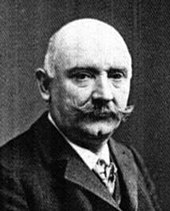Ludwig Werner
Ludwig Werner (born February 16, 1855 in Bubenrode ; † January 1928 ) was an editor and one of the leading anti-Semites in Northern Hesse . From 1890 to 1918 he was a member of the German Reichstag for the anti-Semitic German Reform Party .
Life
Werner was born as the son of a landlord on the Bubenrode estate near Malsfeld in northern Hesse. Until 1871 he attended the teaching and education institute of Prof. Dr. Schenk in Friedrichsdorf near Homburg vd Höhe , but then broke off his school education. Instead, completed a commercial apprenticeship in Hersfeld and then initially worked as a businessman.
Werner was one of the founders of the anti-Semitic Kassel Reform Association in 1881 , and remained its chairman for many years. From July 1, 1882, he then edited the weekly newspaper Reichsgeldmonopol , which he himself published under the motto “The Jewish question is the social question ” in Kassel , a propaganda paper that was published from 1892 to 1895 under the title Antisemitisches Volksblatt , 1896 to 1899 as the Hessischer Volksbote . As an editor, Werner dealt almost exclusively with the economic problems of the peasants and petty bourgeoisie, which he originally linked to the "Jewish question". His paper found, with Jewish anecdotes and sensational usury stories , a considerable readership in Northern and Upper Hesse. In the 1880s Werner and Otto Böckel (1859–1923) were the leading anti-Semites in the former Kurhessen , which became a stronghold of anti-Semitism. Although the two fell out at times, they found themselves together again in 1890 in the Anti-Semitic People's Party .
Werner was elected to the Reichstag on February 20, 1890 for the constituency of Rinteln - Hofgeismar - Wolfhagen . There he joined forces with the radical anti-Semites Böckel, Oswald Zimmermann (1859-1910) and Wilhelm Pickenbach (1850-1903) in June 1890 to form the "Fraction of Anti-Semites". When Max Liebermann von Sonnenberg refused to join, the four of them founded the radical Anti-Semitic Party in Erfurt in July 1890, which was soon renamed the Anti-Semitic People's Party and in 1893 the German Reform Party .
In the fall of 1892 Werner and Böckel appeared at a number of anti-Semitic gatherings in Hersfeld , Rotenburg an der Fulda and a number of rural communities in the area. Immediately after the dissolution of the Reichstag on May 6, 1893, they opened the election campaign on May 7 in Schenklengsfeld in the constituency of Hersfeld - Hünfeld - Rotenburg , which they had declared "ready for storm" , with Ludwig Werner as the candidate. In the elections on June 15, 1893, Werner achieved 26.6% of the votes in his previous constituency of Rinteln-Hofgeismar-Wolfhagen and 34.3% of the votes in Hersfeld-Hünfeld-Rotenburg. He won the runoff election in Rinteln-Hofgeismar-Wolfhagen on June 24, 1893 with 56.3%. He won the runoff election on June 24th in Hersfeld-Hünfeld-Rotenburg, against the conservative Hersfeld District Administrator Freiherr von Schleinitz, an opponent of anti-Semitism based on Christian convictions, with 62.3% of the vote. He accepted the mandate for Hersfeld-Hünfeld-Rotenburg.
Werner was regularly re-elected and represented the constituency of Hersfeld-Hünfeld-Rotenburg until the end of the German Empire in 1918. From 1911 to 1914 he was chairman of the German Reform Party. When the anti-Semites of the German Social Party and the German Reform Party merged to form the German Volkish Party founded on March 22, 1914, Ludwig Werner took over the office of 2nd chairman.
From 1898 to 1904 he was also a member of the Hessen-Nassau Landtag and from 1898 to 1908 a member of the Prussian House of Representatives .
Notes and individual references
- ↑ http://www.hassia-judaica.de/Themen/1893_Antisemitismus_mit_dem_Stimmzettel_Teil1/18936.htm
- ^ Reichsgeldmonopoly , published by Ludwig Werner, dated June 12, 1886 with the report on the "Anti-Semitic Congress in Cassel"
- ↑ In the Reichstag elections of 1893, anti-Semitic candidates won five of the eight constituencies in the Kassel administrative region. Only the constituencies of Kassel-Melsungen, Fulda-Schlüchtern-Gersfeld and Hanau-Gelnhausen were excluded. See http://antisemiten-im-reichstag.netfirms.com/wahlen.html ( Memento from July 14, 2011 in the Internet Archive )
- ↑ http://www.hassia-judaica.de/Themen/1893_Antisemitismus_mit_dem_Stimmzettel_Teil1/18932.htm
- ^ Hersfelder Zeitung, November 8, 1892
- ↑ http://www.hassia-judaica.de/Themen/1893_Antisemitismus_mit_dem_Stimmzettel_Teil1/189311.htm
- ↑ In his previous constituency of Rinteln-Hofgeismar-Wolfhagen, the anti-Semite Adolf König won the Reichstag mandate by by-election. http://antisemiten-im-reichstag.netfirms.com/wahlen.html ( Memento from July 14, 2011 in the Internet Archive )
- ↑ http://www.hassia-judaica.de/Themen/1893_Antisemitismus_mit_dem_Stimmzettel_Teil1/189330.htm
- ^ Mann, Bernhard (edit.): Biographical manual for the Prussian House of Representatives. 1867-1918. Collaboration with Martin Doerry , Cornelia Rauh and Thomas Kühne . Düsseldorf: Droste Verlag, 1988, p. 412f (handbooks on the history of parliamentarism and political parties: vol. 3)
Web links
- Ludwig Werner in the database of members of the Reichstag
- Biography of Ludwig Werner . In: Heinrich Best : database of the members of the Reichstag of the Empire 1867/71 to 1918 (Biorab - Kaiserreich)
- http://www.hassia-judaica.de/Themen/1893_Antisemitismus_mit_dem_Stimmzettel_Teil1/1893.htm
- http://www.dhm.de/lemo/html/kaiserreich/innenpolitik/antisem/index.html
- Werner, Ludwig. Hessian biography. (As of March 2, 2020). In: Landesgeschichtliches Informationssystem Hessen (LAGIS).
| personal data | |
|---|---|
| SURNAME | Werner, Ludwig |
| BRIEF DESCRIPTION | German editor and politician, MdR, anti-Semite |
| DATE OF BIRTH | February 16, 1855 |
| PLACE OF BIRTH | Bubenrode |
| DATE OF DEATH | January 1928 |
